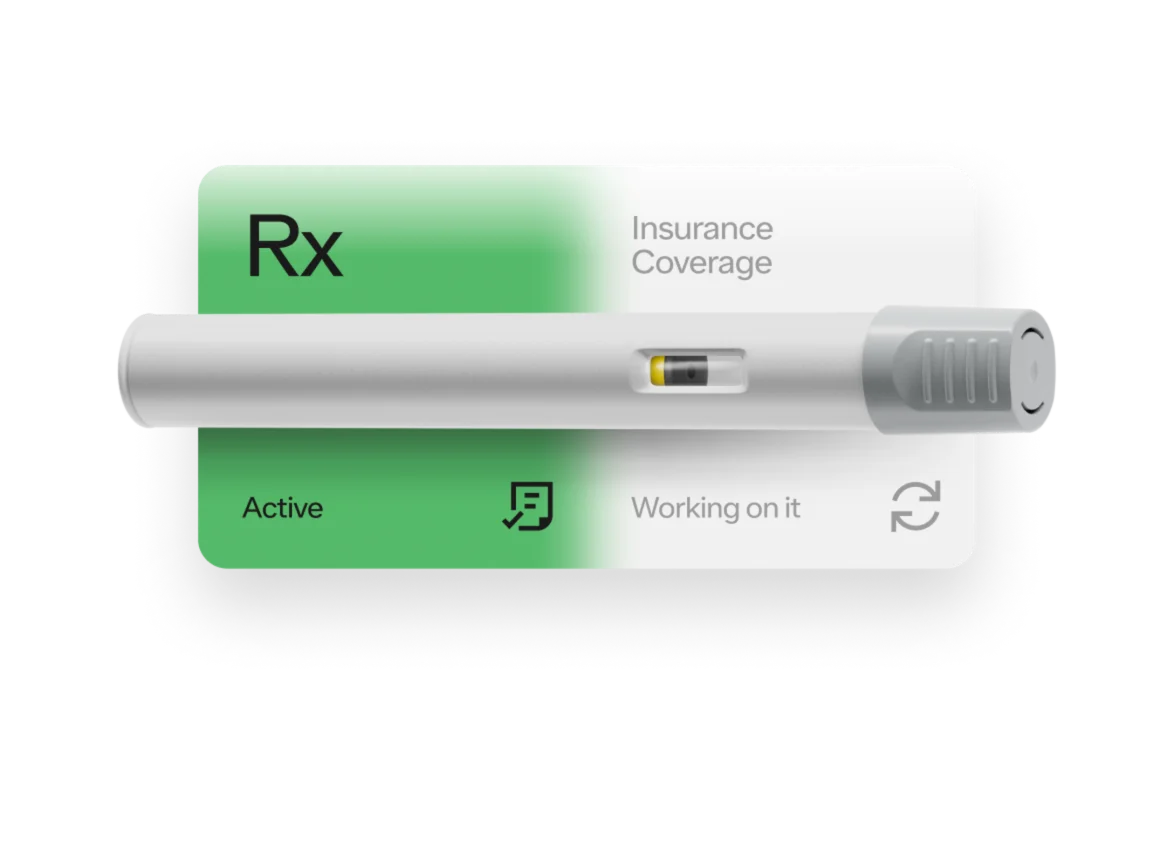Key takeaways
Medicare Part D may cover Wegovy for heart disease in people with heart disease and obesity or overweight.
While copays for Wegovy can vary by plan, total annual out-of-pocket costs for prescription drugs for people on Medicare are capped at $2,000 for 2025.
If you’re not eligible for coverage, there are still ways to save on Wegovy, including paying in cash (such as through Ro), using discount cards, and more.
Here's what we'll cover
Here's what we'll cover
Here's what we'll cover
Key takeaways
Medicare Part D may cover Wegovy for heart disease in people with heart disease and obesity or overweight.
While copays for Wegovy can vary by plan, total annual out-of-pocket costs for prescription drugs for people on Medicare are capped at $2,000 for 2025.
If you’re not eligible for coverage, there are still ways to save on Wegovy, including paying in cash (such as through Ro), using discount cards, and more.
When it first hit the market, Wegovy (semaglutide) was only approved for weight loss and management. Since then, however, it’s added a new indication to its resume: reducing the risk of heart attack and stroke in certain populations. Given the drug’s expanded use, it makes sense to wonder if Medicare will now cover Wegovy for heart disease — especially since the government-funded insurance typically does not cover weight loss medications.
The short answer? Yes, Medicare Part D can cover Wegovy. But there are limitations, and Part D prescription drug plans can vary.
Keep reading to learn more about whether Medicare covers Wegovy for heart disease, how much the drug might cost with coverage, and how to save if you pay for the medication.
Does Medicare cover Wegovy for heart disease?
Medicare Part D may cover Wegovy for individuals with heart disease who also have obesity or overweight.
In March 2024, the US Food and Drug Administration (FDA) expanded Wegovy’s indications to include heart disease. More specifically, the agency approved the drug to reduce the risk of major cardiovascular problems, such as heart attack and stroke, in adults with heart disease and either obesity or overweight.
This new indication means Wegovy may be considered a cardiovascular medication, which opens the door for Medicare Part D to potentially cover it.
Current law does not allow Medicare Part D to cover weight loss drugs, and Wegovy was previously only FDA-approved for weight loss and management in people with obesity or overweight who had at least one weight-related health condition (e.g. high blood pressure, diabetes).
Thanks to the new indication, about 3.6 million Americans with obesity or overweight on Medicare may now be eligible for Wegovy coverage to reduce their cardiovascular risk, according to KFF.
That said, Medicare still does not cover Wegovy when it’s prescribed for weight loss and management alone. For a medication to be covered by Medicare, it must be approved for a medically accepted indication, such as heart disease.
Wegovy may only be covered if you have Medicare Part D, which provides coverage for prescription medications. Medicare Part B, on the other hand, does not cover Wegovy. Instead, Medicare Part B covers only diabetic medical supplies, certain medications and vaccines, and some physician-administered treatments.
If you have a Medicare Advantage or “Part C” plan (instead of Original Medicare), you should check if your plan now includes coverage of Wegovy. While these plans offer prescription drug coverage, the covered medications and costs can vary. Prior authorization may be required before your health insurance will cover Wegovy.
Why doesn’t Medicare cover Wegovy for weight loss?
Unfortunately, Medicare does not cover Wegovy for weight loss. The Medicare Modernization Act of 2003 does not allow Medicare to cover antiobesity medications like Wegovy. Wegovy can only be covered under Medicare Part D if you have a diagnosis of cardiovascular disease.
How much does Wegovy cost with Medicare?
The cost of Wegovy, when covered by Medicare Part D, depends on the details of your plan, specifically the deductible and copay. Some Medicare Part D plans may classify Wegovy as a specialty or higher-tier drug, which has the highest copayment.
If your plan charges coinsurance for Wegovy, you may pay $325–$430 per month for the drug, which is a portion of the drug’s $1,349.02 list price. The best way to know how much you’ll pay for Wegovy is to review your plan’s prescription drug coverage on the Medicare site here.
The Inflation Reduction Act caps the total out-of-pocket costs Medicare enrollees pay for prescription drugs. In 2024, this ranges from $3,300–$3,800. In 2025, this is capped at $2,000. Once you hit the max, you’ll pay $0 for covered Medicare Part D drugs for the rest of the year.
How can Wegovy help treat heart disease?
In clinical trials, people taking Wegovy lost an average of 9.6%–16% of their body weight in about a year and a half. As many as 85% of people lost at least 5% of their body weight. This amount of weight loss on its own can lower your risk of experiencing a heart attack or other major cardiovascular event. Living with obesity raises your risk of heart disease.
In addition to promoting significant weight loss, Wegovy may further reduce cardiovascular risks by addressing inflammation associated with obesity. For example, people with obesity typically have elevated levels of C-reactive protein (CRP).
CRP levels are higher when people have inflammation or infection, and Wegovy may have an anti-inflammatory effect that reduces CRP levels in people with obesity. Losing weight also tends to lower CRP levels.
Clinical trials show that Wegovy lowers the risk of heart attack, stroke, or death from heart disease by 20%. Among people with type 2 diabetes and obesity, Wegovy may lower these risks by as much as 26%, according to an earlier 2016 study.
Research suggests that taking Wegovy also offers other benefits related to heart health, including improved blood pressure and cholesterol.
Other ways to get Wegovy
Medicare does not cover Wegovy for weight loss. So, if you haven’t been diagnosed with heart disease, Medicare will not cover it. At the time of writing, there is no approved generic form of Wegovy, and brand-name Wegovy has a list price of more than $1,300 per month out-of-pocket.
Still, there are ways to save on Wegovy if Medicare won’t cover it.
Price-shop at different pharmacies
Your first step is to call around to different pharmacies in your area or check the pharmacy’s website for pricing information. The list price of Wegovy is $1,349.02 for a 28-day supply. But pharmacies can charge a higher retail price for the medication. Some pharmacies may offer Wegovy for a more affordable price than others, so it’s a good idea to check.
You can also consider getting Wegovy online or through a mail-order pharmacy. And some pharmacies will offer Wegovy at a discounted price if you order a two- or three-month supply.
Pay in cash
No insurance coverage? No problem. You can save on Wegovy by opting to self-pay — aka pay in cash — can help you save on Wegovy. Thanks to its integration with NovoCare, Novo Nordisk’s pharmacy, Ro offers Wegovy at a fraction of its list price for those who pay in cash.
Here’s what this means: Through Ro, you can get Wegovy for $199 per month for the first two months and $349 thereafter when you pay with cash. (Head’s up: The $199 per month offer is only available for a limited time — until March 31, 2026 — and is only valid for the 0.25 mg and 0.5 mg doses of the drug.)
Look into prescription discount cards
Several websites — including GoodRx, Optum Perks, SingleCare, Drugs.com, and WellRx — offer discount cards that you can use at specific pharmacies. These can bring down the price of Wegovy significantly.
For example, on GoodRx, you can save up to 20% off the retail price of Wegovy. All you need to do is select your dosage of Wegovy and your preferred pharmacy and download or print the discount card.
Novo Nordisk, the maker of Wegovy, also offers a Wegovy Savings Card. However, people with Part D coverage through Medicare are not eligible for the card. There is no Patient Assistance Program (PAP) for Wegovy at this time.
Consider Wegovy alternatives
You can also ask your healthcare provider about other alternatives to Wegovy, which may be more affordable.
Ozempic (semaglutide), for example, is another once-weekly injectable medication that contains the same active ingredient as Wegovy in lower dosage amounts. It is FDA-approved to help manage blood sugar levels and lower heart disease risks in people with type 2 diabetes.
Victoza (liraglutide) is another option. It is FDA-approved for the same uses as Ozempic, but it involves a daily injection.
Ozempic costs $997.58 per month, which is about $351 less than the list price of Wegovy. Victoza can be even more affordable, with average costs ranging from $543.51–$815.27.
And because neither Ozempic nor Victoza includes weight loss as one of its indications, both drugs tend to be covered by Medicare — but only if you are taking it to treat either heart disease or type 2 diabetes.
Bottom line
Now that the FDA has expanded Wegovy’s indications to include heart disease, the drug can be covered through Medicare Part D. Here’s what you need to know:
Whether Medicare covers Wegovy is diagnosis-based. Wegovy is only covered under Medicare Part D if prescribed to reduce cardiovascular risk in adults with heart disease and obesity or overweight — not for weight loss alone.
Out-of-pocket costs have limits. Starting in 2025, total annual prescription drug spending for Medicare enrollees is capped at $2,000.
You still have savings options. If you don’t qualify for coverage, consider Ro’s cash-pay pricing, pharmacy discount cards, or lower-cost alternatives like Ozempic or Victoza. (But keep in mind these other drugs are not approved for weight loss and may only be covered by Medicare if prescribed for their FDA-approved indications.)
DISCLAIMER
If you have any medical questions or concerns, please talk to your healthcare provider. The articles on Health Guide are underpinned by peer-reviewed research and information drawn from medical societies and governmental agencies. However, they are not a substitute for professional medical advice, diagnosis, or treatment.
Wegovy Important Safety Information: Read more about serious warnings and safety info.
Ozempic Important Safety Information: Read more about serious warnings and safety info.
References
Farhana, A. & Rehman, A. (2023). Metabolic Consequences of Weight Reduction. StatPearls. Retrieved from https://www.ncbi.nlm.nih.gov/books/NBK572145/
GoodRx. (n.d.). Wegovy Pen Coupons, Cost & Savings Cards. Retrieved from https://www.goodrx.com/wegovy
KFF-a. (2024). A New Use for Wegovy Opens the Door to Medicare Coverage for Millions of People with Obesity. Retrieved from https://www.kff.org/medicare/issue-brief/a-new-use-for-wegovy-opens-the-door-to-medicare-coverage-for-millions-of-people-with-obesity/
KFF-b. (2024). An Estimated 1 in 4 Medicare Beneficiaries With Obesity or Overweight Could Be Eligible for Medicare Coverage of Wegovy, an Anti-Obesity Drug, to Reduce Heart Risk. Retrieved from https://www.kff.org/medicare/press-release/an-estimated-1-in-4-medicare-beneficiaries-with-obesity-or-overweight-could-be-eligible-for-medicare-coverage-of-wegovy-an-anti-obesity-drug-to-reduce-heart-risk/
Kosiborod, M. N., Bhatta, M., Davies, M., et al. (2023). Semaglutide improves cardiometabolic risk factors in adults with overweight or obesity: STEP 1 and 4 exploratory analyses. Diabetes, Obesity & Metabolism, 25(2), 468–478. doi: 10.1111/dom.14890. Retrieved from https://www.ncbi.nlm.nih.gov/pmc/articles/PMC10092593/
Lincoff, A. M., Brown-Frandsen, K., Colhoun, H. M., et al. (2023). Semaglutide and Cardiovascular Outcomes in Obesity without Diabetes. The New England Journal of Medicine, 389(24), 2221–2232. doi: 10.1056/NEJMoa2307563. Retrieved from https://www.nejm.org/doi/10.1056/NEJMoa2307563
Lingvay, I., Brown-Frandsen, K., Colhoun, H. M., et al. (2023). Semaglutide for cardiovascular event reduction in people with overweight or obesity: SELECT study baseline characteristics. Obesity (Silver Spring, Md.), 31(1), 111–122. doi: 10.1002/oby.23621. Retrieved from https://pmc.ncbi.nlm.nih.gov/articles/PMC10107832/
Marso, S. P., Bain, S. C., Consoli, A., et al. (2016). Semaglutide and Cardiovascular Outcomes in Patients with Type 2 Diabetes. New England Journal of Medicine, 375(19), 1834–1844. doi: 10.1056/nejmoa1607141. Retrieved from https://www.nejm.org/doi/full/10.1056/nejmoa1607141
Medicare.gov. (n.d.). What Medicare Part D drug plans cover. Retrieved from https://www.medicare.gov/drug-coverage-part-d/what-medicare-part-d-drug-plans-cover
NovoCare-a. (2024). Find out the cost for Ozempic. Novo Nordisk. Retrieved from https://www.novocare.com/diabetes/products/ozempic/explaining-list-price.html
NovoCare-b. (2024). Terms and conditions of use: Standard Savings Offer. Novo Nordisk. Retrieved from https://www.novocare.com/eligibility/obesity-savings-card.html
NovoCare-c. (2024). What is the list price for Wegovy and will it impact me?. Novo Nordisk. Retrieved from https://www.novocare.com/obesity/products/wegovy/let-us-help/explaining-list-price.html
Novo Pricing. (2024). Victoza Pricing. Novo Nordisk. Retrieved from https://www.novopricing.com/victoza.html
Social Security Administration (SSA). (2006). Medicare Modernization Act. Retrieved from https://www.ssa.gov/privacy/pia/Medicare%20Modernization%20Act%20(MMA)%20FY07.htm
U.S. Centers for Medicare & Medicaid Services (CMS). (n.d.). Lower out-of-pocket drug costs in 2024 and 2025. Retrieved from https://www.cms.gov/files/document/lower-out-pocket-drug-costs-2024-and-2025-article.pdf
U.S. Centers for Medicare & Medicaid Services (CMS). (2016). Medicare Prescription Drug Benefit Manual: Chapter 6 – Part D Drugs and Formulary Requirements. Retrieved from https://www.cms.gov/medicare/prescription-drug-coverage/prescriptiondrugcovcontra/downloads/part-d-benefits-manual-chapter-6.pdf#page=13
U.S. Centers for Medicare & Medicaid Services (CMS). (2024). Part D Improvements. Retrieved from https://www.cms.gov/inflation-reduction-act-and-medicare/part-d-improvements
U.S. Food & Drug Administration (FDA-a). (2024). FDA News Release: FDA Approves First Treatment to Reduce Risk of Serious Heart Problems Specifically in Adults with Obesity or Overweight. Retrieved from https://www.fda.gov/news-events/press-announcements/fda-approves-first-treatment-reduce-risk-serious-heart-problems-specifically-adults-obesity-or
U.S. Food & Drug Administration (FDA-a). (2025). Prescribing Information: Ozempic (semaglutide) injection, for subcutaneous use. Retrieved from https://www.accessdata.fda.gov/drugsatfda_docs/label/2025/209637s035,209637s037lbl.pdf
U.S. Food & Drug Administration (FDA-b). (2025). Prescribing Information: Wegovy (semaglutide) injection, for subcutaneous use. Retrieved from https://www.accessdata.fda.gov/drugsatfda_docs/label/2025/215256s026lbl.pdf
U.S. Food and Drug Administration (FDA-b). (2024). Victoza (liraglutide) injection, for subcutaneous use. Retrieved from https://www.accessdata.fda.gov/drugsatfda_docs/label/2024/022341Orig1s043lbl.pdf
Verma, S., Bhatta, M., Davies, M., et al. (2022). Effects of once-weekly semaglutide 2.4 mg on C-reactive protein in adults with overweight or obesity (STEP 1, 2, and 3): Exploratory analyses of three randomised, double-blind, placebo-controlled, phase 3 trials. EClinicalMedicine, 55, 101737. doi: 10.1016/j.eclinm.2022.101737. Retrieved from https://pmc.ncbi.nlm.nih.gov/articles/PMC9713290/














